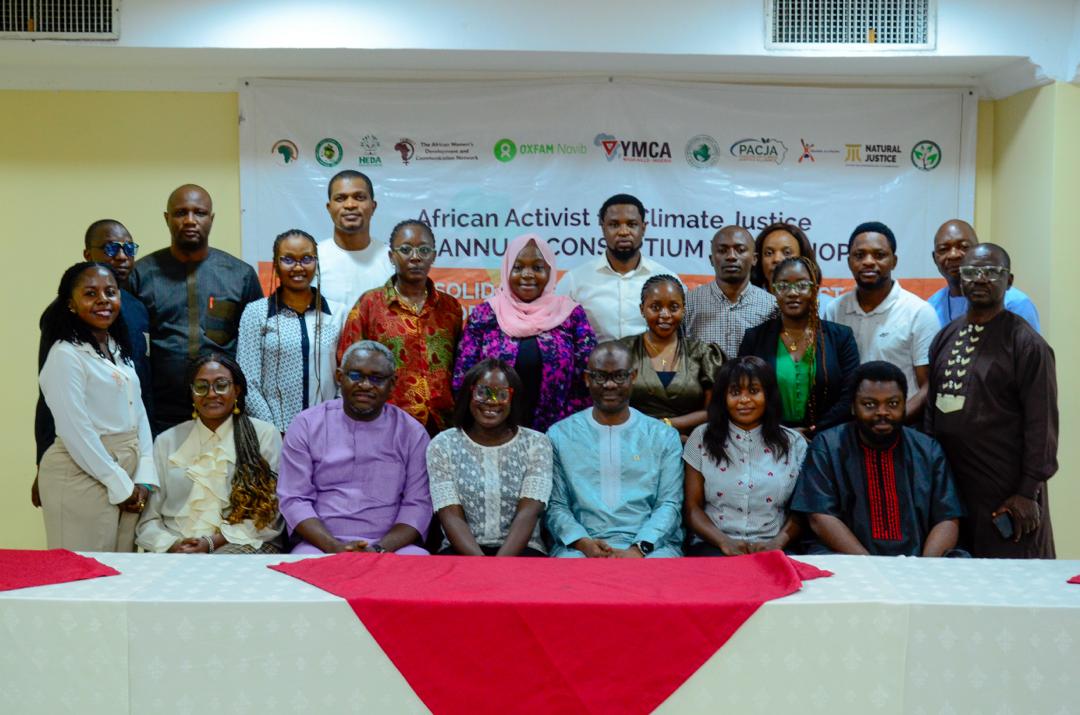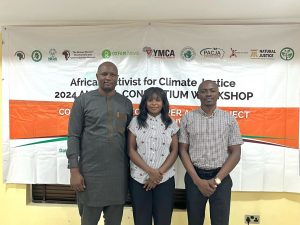
Written by Mariam Idris
The African Activist for Climate Justice (AACJ) project have potentially expanded in recent years ranging from its reach and influence which comes with increasing complexities in its project campaigns and cross-global collaborations.
The 2024 Annual Consortium review Workshop presents a vital opportunity to streamline coordination and delivery mechanism, ensuring maximum impact and the sustainable achievement of the ambitious climate justice goals of consortium members.
The recently concluded AACJ Consortium Workshop held in Ikeja GRA, Lagos state, Nigeria from 26th – 28th February, 2024 witnessed an exchange of ideas and learning from esteemed organisations dedicated to advancing climate justice and environmental advocacy.
Representatives from various entities, including Climate and Sustainable Development Network (CSDevNet), Oxfam, GIFSEP, YMCA, EVA, and others, gathered to discuss the progress and challenges of the AACJ project. This article highlights the key points from the from participants during the event.
Mr. Tijani Hamza, the Country Director of Oxfam, began by extending congratulations to Human and Environmental Development Agenda (HEDA) on its two-decade milestone. He emphasised the importance of the annual consortium workshop as an opportunity for partners to come together, discuss challenges, and strengthen collaborations.
Mr. Hamza highlighted the overarching goal of the AACJ project, which is to advance the rights of individuals in frontline communities, build their capacity to respond to climate change, and foster resilience.
Addressing the looming threat of climate-induced migration, Mr. Hamza underscored the necessity of the AACJ project.
He praised partner organisations for their commitment to embedded theories of change, advocating for climate justice, addressing structural inequalities, and promoting systemic change. Acknowledging the importance of cross-learning, he urged partners to challenge Oxfam when necessary and emphasised the value of a collaborative, brotherhood-like relationship.
Mr. Kenneth Akpan from Oxfam focused on Monitoring and Evaluation (M&E) during his goodwill message. He highlighted the significance of M&E, especially in reporting, and introduced Michael Datemua, who would guide partners through the essential aspects of reporting.

Mr. Akpan expressed gratitude for the positive mid-term review and commended Nigeria’s high scores. He also acknowledged the support from the Dutch Ministry and stressed the need to celebrate consortium achievements, emphasising that the AACJ project would conclude on December 31, 2025.
To ensure project sustainability, Mr. Akpan urged partners to engage in activities beyond the AACJ project, such as linking women to carbon emission initiatives and connecting projects with educational institutions. He emphasied the importance of research in project execution and outlined plans for a robust Monitoring, Evaluation, Accountability, and Learning process in Year 4.
Mr. Paul Joseph, standing in for the National Network Coordinator of CSDevNet, underscored the organisation’s contributions and project activities to achieve climate justice through resilience building of communities, provision of alternative sources of livelihood, and policy influencing at the state and national level.
Mr. Benson from the PMU expressed excitement about the workshop, emphasising its importance in reviewing partners’ work. He encouraged partners to focus on risk management and metrics and highlighted the support the PMU would provide, expressing anticipation for positive outcomes.
CSDevNet participation at the AACJ Consortium Workshop showcased the collaborative spirit among organisations dedicated to climate justice and environmental advocacy.
The commitment to addressing challenges, fostering cross-learning, and ensuring project sustainability emerged as key themes, reflecting the shared goal of creating positive impacts in frontline communities.
The workshop provided a platform for valuable discussions, strategic planning, and renewed determination to achieve the objectives of the AACJ project.
